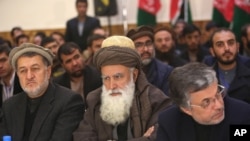A group of Afghan warlords and lawmakers on Friday set up the country's first opposition party in 14 years in a bid to pressure the Kabul government to deliver on its economic and security promises.
The new Afghanistan Protection and Stability Council is "not an anti-government body" but is seeking "fundamental reforms to the way government operates," said Abdul Rasool Sayyaf, a leader of the newly-formed party and a former militia commander.
President Ashraf Ghani took office last year promising to end the 14-year war with the Taliban and improve the moribund economy, but he has made little progress.
The Pentagon warned in a report this week that violence in Afghanistan will worsen in 2016 due to reinvigorated Taliban fighting across the country and the emergence of Islamic State group affiliates, who have seized territory in the east.
The official unemployment rate in Afghanistan is 24 per cent, but joblessness is higher among young men, who are vulnerable to recruitment by insurgent groups.
The APSC, inaugurated in the capital, Kabul, is the first opposition party to be established in Afghanistan since the Taliban were toppled in 2001.
Sayyaf said the council's first demand was for electoral reform. Last year, a disputed presidential poll led to the formation of a National Unity Government, which brought Ghani and his nearest rival, Chief Executive Abdullah Abdullah, together in a power-sharing deal.
Sayyaf called on the government to "use the mujahedeen" in its battle against insurgents, referring to the former warlords and battlefield commanders who defeated the Soviet army in the 1980s, and then supported the 2001 U.S. invasion that toppled the Taliban.
"Many people say that the mujahedeen just want more power and positions in government, but we reflect the concerns of the Afghan people," he said.
Political analyst Javid Kohistani said the new party would not win support from women or youth, as many of its members have reputations for extreme religious views and have been accused of human rights abuses.
"They raise reform slogans today but will achieve nothing," Kohistani said. "Many of these figures were in the last government and did nothing then."




